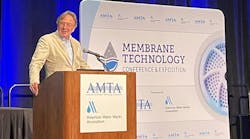ATLANTA, ETC., Feb, 25, 2016 -- The U.S. Environmental Protection Agency (EPA) has awarded a grants to 38 university student teams for proposed projects to develop new, sustainable products and strategies through the People, Prosperity and the Planet (P3) program.
“This year’s P3 teams have created innovative research projects that tackle some of our most pressing environmental and public health challenges,” said Dr. Thomas A. Burke, EPA’s Science Advisor and Deputy Assistant Administrator of EPA’s Office of Research and Development. “These students have the opportunity to bring their exciting new ideas for innovation in sustainability to life, by expanding their learning experience beyond the classroom.”
Several of the grants were awarded to projects related to water. Each team will receive up to $15,000 for their proposals.
At Mississippi State University (MSU) in Starkville, Miss., led by principal investigator Dr. Veera Gnaneswar Gude, students will use the grant funds to develop a low-cost desalination process for rural and coastal communities. The team will refine an existing, novel low-temperature thermal desalination system MSU developed which operates under natural vacuum using process waste heat and solar collectors. Use of renewable energy sources, particularly solar, to drive desalination can be a sustainable and affordable approach to reclaim potable water from seawater and brackish waters.
At the University of North Carolina at Chapel Hill (UNC), led by principal investigator Mark D. Sobsey, the UNC team will use the grant funds to develop a simple, self-contained, low-cost and portable test for cholera in drinking water. An estimated 1.4 billion people worldwide are at risk of cholera, the disease caused by the bacterium V. cholerae. Effective disease control depends on timely detection of the bacteria in drinking water. An existing compartment bag test (CBT) uses a multi-chambered plastic bag and a chromogenic medium “test bud” to detect and quantify E. coli bacteria in water. The team proposes to adapt the CBT system to detect and quantify V. cholerae bacteria in water using the same principles and similar technologies as now used to detect E. coli.
Funding for the P3 competition is divided into two phases. Teams selected for Phase I awards receive grants of up to $15,000 to fund the development of their projects, which are then showcased at the National Sustainable Design Expo in the spring. Following the Expo, P3 teams compete for Phase II awards of up to $75,000 to further develop their designs and potentially bring them to the marketplace.
Other grantees include student teams from University of Missouri - Columbia, where students are working on a project involving water quality monitoring at hydraulic fracturing sites using molecularly imprinted porous hydrogels; University of California - Riverside, where students are developing Sustain-A-Drain: a novel indicative hydrocarbon filtration system; University of California - Santa Cruz, where students are evaluating reactive barrier technology to enhance microbially -mediated denitrification during managed aquifer recharge; and University of Central Florida's Algae Biofuel Osmosis Dewatering (ABODE): A novel process for biofuel feedstock generation and advances in microalgae separation using forward osmosis; University of Arkansas - Fayetteville, where a team is developing a biosensor design for infectious, water-borne agents; Southern Methodist University's synthesis of graphene oxide/magnesium oxide nanoparticles and its application for removal of emerging contaminants in drinking water; Mississippi State University, where the team is working on a low cost desalination process for rural and coastal communities; Lewis University, where students are designing a solar powered water purification system utilizing biomimetic photocatalytic nanocomposite materials; Antioch College's Xylem Filtration: The Next Generation Approach to Accessing Clean Drinking Water; Auburn University, where a team is working on the development of 3D-printed surfaces for ultra-high surface area trickling biofilters for water pollution remediation; California State University - Chico, where the student team is evaluating biofiltration in small urban areas using Chico, California as a Case Study.
In 2011, a P3 team from Embry-Riddle Aeronautical University developed a portable, solar powered, water purification system in the form of a backpack. The team went on to launch AquaSolve Ventures to produce backpacks that are capable of purifying an impressive 4,300 gallons of water a day. Yet another P3 success is the startup OneEarth Designs, which specializes in solar powered technology, formed from a 2010 Harvard University P3 team. One Earth Designs’ signature product, the SolSource 3-in-1, is a 100 percent solar powered grill that can harness the power of the sun to provide home heating and electricity.
View the P3 winners: http://www.epa.gov/P3/20152016-p3-grant-recipients.
For more information on the P3 Program, visit: http://www.epa.gov/P3
View highlights from the 2015 P3 event: https://youtu.be/URGEUcDtaMA


